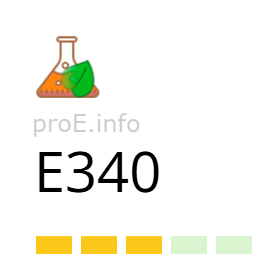
Other names for the additive (synonyms)
General Information
Food additive E340 (potassium phosphates) refers to a group of compounds — salts of orthophosphoric acid and potassium, used in the food industry as an acidity regulator, emulsifier, stabilizer, thickener, or moisture-retaining agent. Additionally, additive E340 can enhance the action of antioxidants.
In nature, potassium phosphates are almost never found in their pure form. In aqueous environments, free potassium phosphates are unstable — they quickly ionize, forming buffer systems that regulate acid-base balance. In living organisms, potassium ions (K⁺) and phosphate anions (H₂PO₄⁻, HPO₄²⁻) are part of ATP, nucleotides, and phospholipids.
Physically, potassium phosphates are crystalline or granulated powders ranging from colorless to white. Additive E340 dissolves well in water but is poorly soluble in ethanol.
Chemically, potassium phosphates are salts and esters of phosphoric acid. Industrially, additive E340 is produced by reacting orthophosphoric acid with potassium hydroxide or potassium carbonate.
There are three types of potassium phosphates used in the food industry:
- E340(i) — Monopotassium phosphate (KH2PO4)
- E340(ii) — Dipotassium phosphate (K2HPO4)
- E340(iii) — Tripotassium phosphate (K3PO4)
Effects on the Body
Benefits of additive E340
Potassium phosphates are involved in energy metabolism, metabolic and enzymatic processes, and help maintain the body's acid-base balance. They are essential for kidney function by aiding hydrogen ion excretion and regulating calcium and phosphorus levels in the blood.
Additive E340 is well absorbed in the gastrointestinal tract and metabolized similarly to natural phosphates. Additionally, potassium supports the normal function of muscles and the nervous system.
Risks of additive E340
When consumed in moderation, additive E340 poses no health risks. However, exceeding the permissible dosages may lead to side effects such as diarrhea, digestive disorders, and electrolyte imbalances.
Some studies confirm that excessive phosphate intake can be dangerous for individuals with impaired kidney function, leading to hyperphosphatemia and an increased risk of cardiovascular diseases.
According to these studies, even in healthy individuals, excess phosphate compounds may cause:
- Hyperphosphatemia
Excess dietary phosphate leads to its accumulation in the blood, disrupting mineral balance and causing systemic complications. - Vascular and arterial calcification
Phosphates promote calcium deposition in vessel walls, causing stiffness and increased risk of atherosclerosis. - Increased cardiovascular risk
High phosphate levels are associated with more frequent heart attacks and cardiac events, even in individuals without kidney disease. - Increased mortality
Epidemiological studies show that even “high-normal” phosphate levels in blood are linked to higher overall mortality, particularly in people with cardiovascular conditions. - Disruption of calcium-phosphorus metabolism
Excess phosphorus impairs calcium absorption and metabolism, potentially leading to calcium deficiency in bones and excess deposition in soft tissues. - Increased kidney load
The kidneys must work harder to eliminate excess phosphates, which is especially harmful for individuals with chronic kidney disease (CKD). - Joint disorders
Calcium pyrophosphate crystal deposition in joints may cause inflammation and pain, a condition known as calcium pyrophosphate deposition disease (CPPD). - Osteoporosis due to calcium-phosphorus imbalance
Disruption in calcium-phosphorus balance leads to bone demineralization and increases fracture risk. - Elevated LDL cholesterol ("bad cholesterol")
High phosphate intake has been associated with increased LDL cholesterol levels, contributing to atherosclerotic plaque formation. - Impaired calcium absorption and deposition in kidneys
Unprocessed phosphorus-calcium complexes may accumulate in the kidneys, forming stones and increasing the risk of kidney failure and osteoporosis.
In 2019, the EFSA Food Additives Committee reassessed the safety of phosphates, including potassium phosphates (E340), and established an Acceptable Daily Intake (ADI) of 40 mg/kg body weight (as phosphorus). The committee expressed concerns over excessive intake in children and recommended revising permissible levels in frequently consumed foods. It also highlighted the need to monitor phosphate additive intake in individuals with kidney diseases.
Uses
In the food industry, potassium phosphates are used to stabilize texture and acidity, prevent separation, retain moisture, and fix color. Additive E340 is found in:
- Bakery and confectionery products
- Dairy products and ice cream
- Soft drinks
- Instant coffee
- Processed cheese (as melting salts)
Additive E340 has proven effective in stabilizing the green color of vegetables during heat treatment. Monopotassium phosphate maintains a neutral pH (≈7), preventing discoloration.
Other applications of potassium phosphates include:
- Medicine — in the production of pharmaceuticals and infusion solutions
- Household chemicals — as water softeners in detergents
- Industry — as components of electrolytes in synthetic rubber production
Legal Status
Additive E340 is approved for use in food products in the European Union (Regulation (EC) No 1333/2008), the USA, Canada, Japan, Australia, Ukraine, and other countries. It is also included in the list of approved additives in the United Kingdom.



